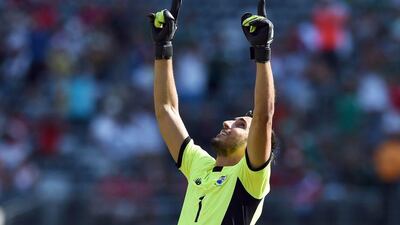Mexico and Panama advanced to a Concacaf Gold Cup semi-final showdown with triumphs Sunday, one thanks to a dramatic save and the other on a penalty kick after a controversial call.
Mexican captain Andres Guardado scored the lone goal from the spot in the 124th minute to lift Mexico over Costa Rica 1-0 while Panama goalkeeper Jaime Penedo denied Lester Peltier in the ninth round of penalty kicks as the “Canaleros” advanced 6-5 over Trinidad and Tobago after a 1-1 draw.
“I feel real joy because today was a real blessing to be able to advance to the next round,” Penedo said.
After losing 2-1 to Panama in last year’s semi-finals, six-time champions Mexico will seek revenge and an eighth trip to the finals of the biennial North and Central American and Caribbean regional football championship when they meet again on Wednesday in Atlanta.
That winner earns a berth in next Sunday’s final at Philadelphia against the winners of Wednesday’s other semi-final between Jamaica and holders United States.
After more than two hours of goal-less football, Guatemalan referee Walter Lopez whistled a hotly contested foul on Costa Rica’s Roy Miller following Mexican striker Oribe Peralta hurling himself onto the ground trying to reach a crossing pass.
“I’m happy with the effort of the players,” Mexican coach Miguel Herrera said. “We were superior. We made an important step.”
The phantom foul brought Guardado to the spot and he blasted the ball into the left side of the net for the victory, delivering the only loss of the event for Costa Rica, who reached the World Cup quarter-finals last year in Brazil.
Costa Rica coach Paulo Wanchope said he did not feel as if his job was in jeopardy after the defeat.
“I do not feel out of the team by being eliminated,” he said. “My players should be proud of how they played. Some of them were exhausted.”
Panama and Trinidad and Tobago were even at 1-1 through extra time, Luis Tejada giving Panama the lead in the 37th minute but Trinidad and Tobago equalising on a Kenwyne Jones header in the 54th minute.
And while Panama advanced, it took a save-or-lose situation in the seventh round of penalty kicks for them to escape.
Each team missed two of their first three penalties. Armando Cooper and Harold Cummings each scored for Panama to open rounds but Jones and Radanfah Abu Bakr answered to keep Trinidad and Tobago going.
Marvin Phillip saved the seventh-round shot of Alberto Quintero to put Panama on the edge of elimination but Trinidad and Tobago’s Daneil Cyrus booted his next shot over the crossbar to extend the drama.
“The key moment was when (Cyrus) took his kick and if they made it they win,” Penedo said. “The referee told me that and I thought ‘Ugh,’ but then he missed and we went on to win and now we can all smile.”
Penedo, the 33-year-old LA Galaxy netminder who was voted 2005 and 2013 Gold Cup Goalkeeper of the Tournament, made two saves in the penalties session, the decisive one set up by teammate Valentin Pimentel’s goal to start the ninth round.
Penedo then went back inside the woodwork and dove to his left on Peltier’s shot. Penedo lifted his right hand and deflected the ball off the crossbar and out, dooming the “Soca Warriors”, who were out to match their Cup-best run by reaching the 2000 last four.
“Every moment has its sensation and own emotion,” Penedo said. “Each one is divine in the moment.”
Panama advanced to a third consecutive semi-final, having lost to the United States in 2011 before beating Mexico in 2013, only to fall to the Americans in the final.
Sunday marked the fourth match in a row in which Panama took the lead only to surrender the equaliser in the second half, having advanced from the group stage on three 1-1 draws.
Follow us on Twitter @NatSportUAE

